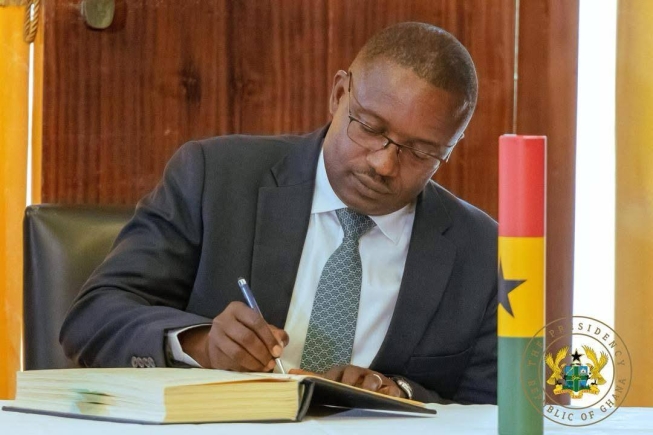
Govt won’t sell power distribution companies to private entities — Energy Minister
THE government has no intention of selling any of the power distribution companies to private entities, the Minister of Energy and Green Transition, John Abdulai Jinapor, has said.
Rather, he said the government was only seeking investment which would enable it to ultimately deliver a reliable and financially viable electricity distribution system.
Addressing a newly inaugurated seven-member committee at the ministry yesterday, Mr Jinapor explained that the move had become necessary to address the numerous inefficiencies, losses and discrepancies negatively impacting the sub-sector.
“The committee's main duty is to consult extensively. Consult companies, industry players, technical people, the unions and all other people.
“Following their consultation, they are supposed to advise this ministry on the best way forward to ensure that we have a private sector participation in Ghana,” Mr Jinapor said.
Committee
The committee is to oversee the inculcation of private sector participation in the distribution of electricity across the country as part of moves to transform the country’s ailing energy sector.
The scope of the committee’s work would focus on private investment in the Electricity Company of Ghana (ECG), the Ghana Grid Company (GRIDCo), the Northern Electricity Distribution Company (NEDCo) among others.
Chaired by Energy Consultant, Jabesh Amisah-Arthur, the technical committee has been tasked with designing a comprehensive and sustainable framework and model for private sector engagement which would involve analysing existing distribution challenges, best practices and proposing an efficient, cost-effective and scalable model.
The committee, which is made up of energy experts and stakeholders in the sector, is to, within one month, also ensure that the model addresses critical issues such as infrastructure investment and customer satisfaction.
Other members of the committee are the Executive Director of the Africa Centre for Energy Policy (ACEP), Benjamin Boakye; a Lecturer with extensive research in the upstream oil and gas sector, Dr Shafic Suleman; a representative of the Public Utilities Regulatory Commission (PURC), Dr Simon Akorli; the General Manager, Energy Acquisition and Risk Management, ECG, Ebenezer Baiden, Emma Akua Bulley and Edward Abrokwah, all representatives from the Energy Ministry and Ministry of Finance respectively.
Local interest
The sector minister charged the committee to pay critical attention to local interests to ensure that the proposed model aligned with the needs and priorities of the communities it serves, while more importantly, addressing local concerns such as affordability, job creation and equitable access to electricity, fosters public trust and minimising resistance to privatisation.
Mr Jinapor further appealed to the management and staff of the companies, the unions in the sector and the general public to cooperate and support the work of the committee to ensure a smooth process and the best outcome in one month.
“So, we have carefully selected a broad spectrum of people with high integrity, people with vast experience to do this job. We will not stampede you but just to re-emphasise that whatever model you choose for us, we will go through a rigorous, transparent, competitive process and none of us will have an interest behind the scenes in terms of allocation of shares and all that,” he added.
Customers first
Expressing appreciation to the Minister of Energy and Green Transition for the trust placed in the members of the committee, Mr Amisah-Arthur pledged to address the concerns of the customers of the electricity.
To achieve this, he said the committee would give attention to recommendations and interventions and lessons from all the efforts that have been made in the past.
“We will also give attention to what will really bring benefits to the sector and customers in terms of financial sustainability of the sector and also address the concerns of other stakeholders such as the owners of the business, the staff and management.
“We will consider what will turn out to be the main weaknesses of the distribution sector and as far as possible give priority to homegrown approaches and homegrown strategies so that the local private sector will have a first bite on any of these interventions that will be made,” Mr Amisah-Arthur added.
